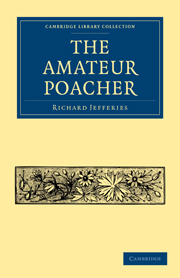Book contents
- Frontmatter
- PREFACE
- Contents
- CHAPTER I THE FIRST GUN
- CHAPTER II THE OLD PUNT: A CURIOUS ‘TURNPIKE’
- CHAPTER III TREE-SHOOTING: A FISHING EXPEDITION
- CHAPTER IV EGG-TIME: A ‘GIP’-TRAP
- CHAPTER V WOODLAND TWILIGHT: TRAITORS ON THE GIBBET
- CHAPTER VI LURCHER-LAND: ‘THE PARK’
- CHAPTER VII OBY, AND HIS SYSTEM: THE MOUCHER's CALENDAR
- CHAPTER VIII CHURCHYARD PHEASANTS: BEFORE THE BENCH
- CHAPTER IX LUKE, THE RABBIT-CONTRACTOR: THE BROOK PATH
- CHAPTER X FARMER WILLUM'S PLACE: SNIPE-SHOOTING
- CHAPTER XI FERRETING: A RABBIT-HUNTER
- CHAPTER XII A WINTER NIGHT: OLD TRICKS: PHEASANT-STALKING: MATCHLOCK VERSUS BREECHLOADER: CONCLUSION
CHAPTER XI - FERRETING: A RABBIT-HUNTER
Published online by Cambridge University Press: 29 August 2010
- Frontmatter
- PREFACE
- Contents
- CHAPTER I THE FIRST GUN
- CHAPTER II THE OLD PUNT: A CURIOUS ‘TURNPIKE’
- CHAPTER III TREE-SHOOTING: A FISHING EXPEDITION
- CHAPTER IV EGG-TIME: A ‘GIP’-TRAP
- CHAPTER V WOODLAND TWILIGHT: TRAITORS ON THE GIBBET
- CHAPTER VI LURCHER-LAND: ‘THE PARK’
- CHAPTER VII OBY, AND HIS SYSTEM: THE MOUCHER's CALENDAR
- CHAPTER VIII CHURCHYARD PHEASANTS: BEFORE THE BENCH
- CHAPTER IX LUKE, THE RABBIT-CONTRACTOR: THE BROOK PATH
- CHAPTER X FARMER WILLUM'S PLACE: SNIPE-SHOOTING
- CHAPTER XI FERRETING: A RABBIT-HUNTER
- CHAPTER XII A WINTER NIGHT: OLD TRICKS: PHEASANT-STALKING: MATCHLOCK VERSUS BREECHLOADER: CONCLUSION
Summary
The ferreting season commences when the frosts have caused the leaves to drop, and the rabbits grow fat from feeding on bark. Early one December morning, Orion and I started, with our man Little John, to ferret a double-mound for our old friend Farmer ‘Willum’ at Redcote.
Little John was a labourer—one of those frequently working at odd times for Luke, the Rabbit- Contractor. We had nicknamed him Little John because of his great size and unwieldy proportions. He was the most useful man we knew for such work; his heart was so thoroughly in it.
He was waiting for us before we had finished breakfast, with his tools and implements, having carefully prepared these while yet it was dark at home in his cottage. The nets require looking to before starting, as they are apt to get into a tangle, and there is nothing so annoying as to have to unravel strings with chilled fingers in a ditch. Some have to be mended, having been torn; some are cast aside altogether because weak and rotten. The twine having been frequently saturated with water has decayed. All the nets are of a light yellow colour from the clay and sand that has worked into the string.
These nets almost filled a sack, into which he also cast a pair of ‘owl-catchers,’ gloves of stout white leather, thick enough to turn a thorn while handling bushes, or to withstand the claws of an owl furiously resisting capture. His ferrets cost him much thought, which to take and which to leave behind.
- Type
- Chapter
- Information
- The Amateur Poacher , pp. 195 - 215Publisher: Cambridge University PressPrint publication year: 2009First published in: 1879



